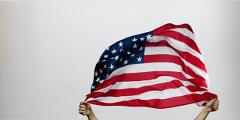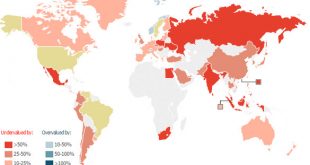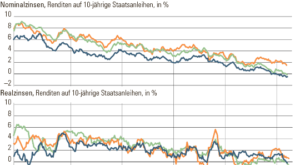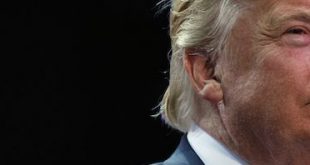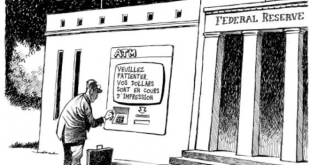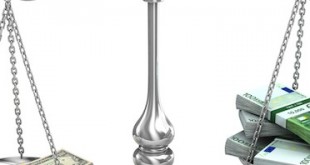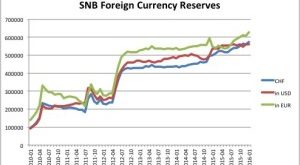So far, there has been little clarity as to which specific trade policies the new president will introduce, but given how high trade ranks on his agenda, this will likely change quickly. But what actual powers does a US president have in the area of trade, and what measures might Mr. Trump implement?...
Read More »The US Dollar Is Now Overvalued Against Almost Every Currency In The World
In September 1986, The Economist weekly newspaper published its first-ever “Big Mac Index”. It was a light-hearted way for the paper to gauge whether foreign currencies are over- or under-valued by comparing the prices of Big Macs around the world. In theory, the price of a Big Mac in Rio de Janeiro should be the same as a Big Mac in Cairo or Toronto. After all, no matter where in the world you buy one, a Big Mac...
Read More »Nominal and Real Interest Rates over the Medium Term
From the NZZ:
Read More »Market Impact of a Trump Presidential Win
The probability of Republican Donald Trump winning the U.S. presidential election on November 8 seems remote at the moment—economists on Credit Suisse’s Global Markets team put it at less than 10 percent. So if it did happen, it would come as a major surprise for financial markets. The last time that kind of seemingly low-likelihood event came to pass—during last June’s Brexit vote—most investors were caught wrong-footed. So how might they best prepare for something as unexpected as President...
Read More »Les dettes ont explosé depuis les subprimes… Liliane Held-Khawam
Mi-2007. Crise américaine dite des Subprimes. Cette crise due à l’endettement hypothécaire de ménages américains à faible revenu a mis le monde planétaire dans un chaos financier, économique, social et sociétal dont les portées ne sont pas encore clairement établies. Le fait est que les Etats et les banques centrales du monde ont dû mettre la main à la poche pour racheter aux banques commerciales des actifs américains pourris et ce au prix avant crise. Voici un graphique qui évalue à...
Read More »Covered Interest Parity and the Risk-Taking Channel
In a speech, Hyun Song Shin points out that CIP increasingly fails to hold: the Dollar interest rate implied by FX swaps vis-a-vis the Euro, Yen, Pound or Swiss Franc is “too high.” Moreover, the deviation is negatively correlated with the Dollar’s spot exchange rate: When the Dollar appreciates, the deviation from CIP widens. Shin argues that bank behavior explains the deviation: … the US dollar is used widely throughout the global banking system, even when neither the lender nor the...
Read More »Le marché libre n’existe pas. LHK +Y A-T-IL EU UN ACCORD DE SHANGHAI? Bruno Bertez
Y a-t-il eu un accord de Shanghaï pour affaiblir le dollar? Avant-propos: Voici une excellente analyse de Bruno Bertez sur le comportement des devises et ses conséquences sur les marchés. On voit bien que dans les moments -clés, le marché s’appelle « accord de Shangaï », « réunion du Plaza », G20, etc. La libre loi du marché n’existe que dans un cadre défini ou rectifié par les uns et les autres. Sans oublier les ententes cartellaires qui jalonnent les faits divers de la finance. Autant...
Read More »Le casino américain est le grand gagnant de la crise de 2011. Liliane Held-Khawam
La crise de 2011 a été un tournant dans la guerre monétaire, financière et économique menée de main de maître par le casino financier mondial. La guerre sévit partout dans le monde. Les exactions spectaculaires des jihadistes dans certaines zones ne devraient pas nous cacher l’autre guerre qui agite le monde dans ses moindres recoins. Une guerre globale accompagne la mondialisation des marchés et l’émergence d’une élite apatride autoproclamée. Cette guerre est monétaire et planétaire. ...
Read More »Is the Dollar Bull Market Over?
Even in the fast-changing world of foreign exchange, investors have been able to count on one thing for the last two years – that the interest rate policies of central banks would be the primary driver of currency movements. The so-called divergence trade hinged on the Federal Reserve’s tightening bias relative to the easing bias of the European Central Bank and Bank of Japan and was a fairly reliable organizing principle for foreign-exchange investors. On a trade-weighted basis, the...
Read More »SNB Foreign Currency Reserves
Rising. Source: SNB. The series “in EUR” is based on the author’s calculations. Note: The exchange rate floor vis-a-vis the Euro was in place from 6 September 2011 until 15 January 2015.
Read More » Swiss Economicblogs.org
Swiss Economicblogs.org

